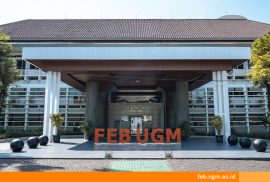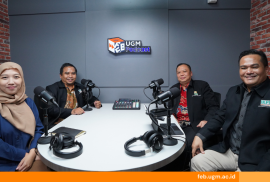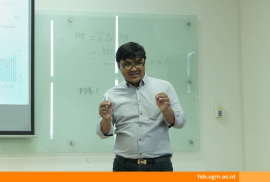Since the end of 2019, the world community has been surprised by the presence of the Covid-19 virus which continues until now and has become one of the largest pandemics in the history of mankind. All levels of society are affected and forced to adapt to all aspects of life. One of the worst affected by this pandemic are small and medium enterprises (SMEs) who are on the front lines of the world’s economic development. Almost 67% of SMEs worldwide have been significantly affected and are in danger of closing their operations due to plummeting demand and difficulties in accessing raw materials (ITC, 2020).
In maintaining their business amidst the Covid-19 pandemic, SME leaders need to make efforts to balance health and economic priorities. They need to adapt their business operations while trying to innovate and discover new opportunities. Internally, SME leaders must pay attention to the required health protocols/measures to prevent the spread of Covid-19. Economically, they must also seek new opportunities by learning to adapt to the external environment, digitally transforming businesses, and creating innovative products to make money in this limited circumstance.
These are challenges that are not easy for SME leaders to face. In response to this, there are several important factors that are integrated with business survival, namely organizational mindfulness, social learning, and opportunistic behavior. However, unfortunately, the relationship between these factors has not been fully explored. Therefore, a group of authors conducted a study aimed at testing and understanding the relationship between organizational mindfulness, social learning, and opportunistic behavior of SME leaders during the Covid-19 pandemic. This research is expected to help SMEs act appropriately and successfully survive the pandemic. The process and the results of the research were written into a journal article entitled “The Effect of Small Business Leaders’ Organizational Mindfulness and Social Learning on Opportunistic Behavior to Survive the Covid-19 Pandemic” by Luluk Lusiantoro, Bernardinus Maria Purwanto, and Rokhima Rostiani.
Before discussing the research further, what is meant by organizational mindfulness itself comes from a Western perspective on the concept of mindfulness, namely a flexible state of mind in which we are actively engaged, paying attention, and sensitive to the current situation. Organizational mindfulness focuses on interactions between individuals in order to mindfully coordinate their actions and emphasizes the important role of leaders to actively stimulate mindful actions in response to changing environments.
Apart from that, learning is also an important aspect of business and is one of the key reasons why new businesses with new opportunities continue to exist. The social learning factor, one of the variables in the research, comes from a theory that argues that individuals can learn new information and behaviors by observing other individuals. Social learning happens through external interactions and its role is very essential when unexpected disruptions occur such as the COVID-19 pandemic.
Research on the relationship between these factors was conducted using interviews and online surveys. The online survey was conducted on 291 participants which consist of owners and managers of SMEs in Indonesia. Meanwhile, the semi-structured online interviews were conducted with 6 SME leaders from various business sectors related to the topic of business continuity amid a pandemic to better grasp this phenomenon. The data were then analyzed using regression on the SmartPLS 3.0 software.
The results of this study suggest that organizational mindfulness and social learning have positive and significant associations with the ability of SME leaders to discover and exploit opportunities. This research also shows the important roles of organizational mindfulness and social learning as unique internal and external capabilities in dealing with disruptions such as the Covid-19 pandemic. Moreover, this research has succeeded in contributing by unraveling the relationship between organizational mindfulness, social learning, and opportunistic behavior for the first time in the context of SMEs facing the Covid-19 pandemic.
Developing organizational mindfulness and social learning can be an alternative way of efficient crisis management for SMEs, the majority of which are vulnerable to crisis. Based on the research, the application of organizational mindfulness is of paramount importance during this COVID-19 pandemic by unraveling hidden opportunities while also ensuring the overall health of the organization and avoiding the wider spread of the virus.
Not only that, but the results of the study also state that SME leaders need to proactively learn from their social environment. In this pandemic situation, information is everywhere and very quickly updated. In order to survive, SME leaders should be able to keep moving forward by always discovering and exploiting any opportunities to stay in business.
—
Paper Author: Luluk Lusiantoro, Bernardinus Maria Purwanto, and Rokhima Rostiani
Published on Journal of Small Business and Enterprise Development, Vol. ahead-of-print No. ahead-of-print.
Link https://doi.org/10.1108/JSBED-02-2021-0061




